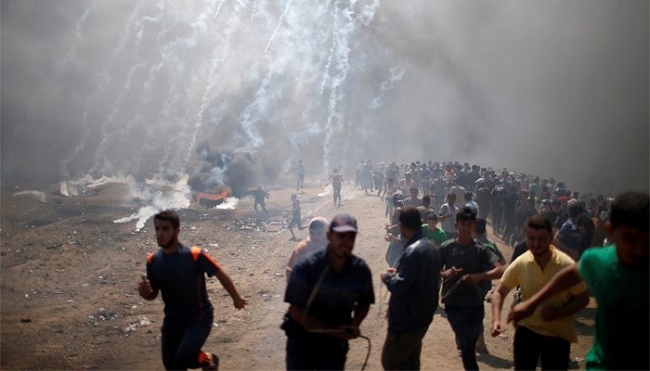


|
Palestinian demonstrators run from tear gas fired by Israeli troops during a protest against US embassy move to Jerusalem at the Israel-Gaza border east of Gaza City, May 14, 2018. (Photo: Reuters) The escalating tensions have led to diplomatic retaliations
between Israel and a number of countries. The "gunpowder” barrel in the
Middle East is at risk of exploding if the parties concerned do not show
restrained.
The US moving its embassy in Israel from Tel Aviv to Jerusalem
and opening the new headquarters inflamed a wave of protests by Palestinians
in the border area between Israel and the Gaza Strip. Israeli soldiers
cracked down on and shot at the demonstrators in the bloodiest clash between
the two sides, killing over 60 Palestinians and injuring more than 2,700
others. Immediately afterwards, many nations strongly criticised Israel’s use
of force against the protesters, stating that the Jewish state "used asymmetric
forces.”
The UN Security Council summoned an urgent meeting in an attempt
to put out the "flames” flaring up in the Gaza Strip. Nickolay Mladenov, UN
Special Coordinator for the Middle East Peace Process, affirmed that Israel
must be responsible for the use of force against the Palestinians. The UK,
France, and other countries in the European Union (EU), strongly condemned
the actions of Israel, while reiterating the EU’s stance on the status of
Jerusalem, whereby all three religions, including Judaism, Islam, and
Catholicism, have close ties to the holy area and this must be maintained.
France affirmed its security pledges with Israel, but stated
that Israel’s security issue cannot account for such a level of violence.
Countries in the region have demonstrated strong opposition to
Israel. The Arab League (AL) held an urgent gathering to discuss the
situation in Gaza. Notably, Turkey was one of the strongest critics of the
violence in Gaza, as well as the US’s embassy move to Jerusalem. Turkey
expelled Israel’s ambassador in Ankara, while Turkish Prime Minister Binali
Yildirim urged Muslim countries to re-examine their relationships with Israel
and called for an "extraordinary summit” of the Organisation for Islamic
Cooperation (OIC) in Istanbul on May 18. In reply, the Israeli Foreign
Ministry asked the Turkish consul-general in Jerusalem to leave the country.
Muslims in many countries took to the streets to express their
solidarity with the Palestinians. More than 2,000 Turkish people poured down
the streets in Istanbul to protest the US’s decision to move its Israeli
embassy to Jerusalem. Hundreds of Arab students rallied in front of the UN
headquarters in the Syrian capital, Damascus, with slogans reading "Jerusalem
will always be the capital of Palestine”. Meanwhile, King Mohammed VI of
Morocco said that the international consensus in opposing the US’s decision
is a "strong message” to support the rights of the Palestinian people. As
criticisms from the public were aimed towards Israel, the US still voiced
advocacy for its ally, stating that Israel acted with the "most restrain
possible” in dealing with the Palestinian protesters.
Palestine in particular, and the international community as a
whole, have called for urgent actions to end the "tragedy” that is happening
to the Palestinians in the Gaza Strip. Russia voiced its willingness to chair
a high-level Palestinian-Israeli meeting to restart direct talks between the
two sides. Russia affirmed that the talks should be resumed on the basis of
the decisions and principles adopted by the UN Security Council, as well as
the Arab Peace Initiative. Despite being an important economic partner of
Israel, Russia also had to state that acting outside the boundaries of
international law only makes the region more unstable.
The Arab countries in the region pledged their support for the
Palestinians’ struggle in restoring their sovereignty and establishing an
independent Palestinian state with the capital of East Jerusalem and the
pre-1967 borderlines. The international community has affirmed its
determination to resolve all problems through dialogue, stressing that the
use of force to threaten civilians is unjustifiable. The unilateral change of
Jerusalem’s status quo will endanger the efforts to seek a comprehensive and
long-term solution to the crisis between Palestine and Israel, causing
serious consequences for regional security and stability.
|
Source: NDO